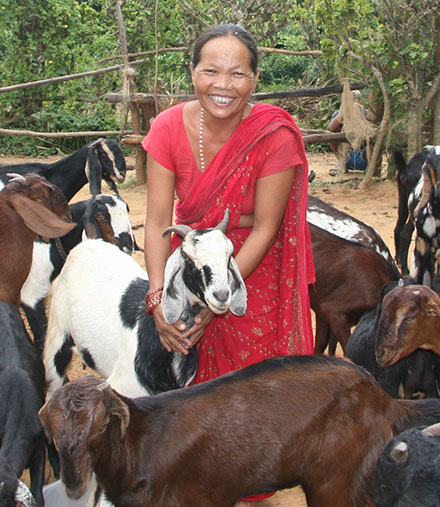
Begum Gharti Magar, 40, has never been to school in her life. Married at 15, she and her husband worked hard to support their family of seven. They have two sons and three daughters.
Not too long ago, Begum and her husband didn’t own any land. They leased 0.3 hectares of land where they grew maize, mustard, lentils and wheat. They had to split half of the produce with the land owner—leaving the family with just enough food to last for only two to three months out of the year. For the rest of the year the couple would go into the forest to collect wild asparagus, bankas (raw material to produce Nepali paper) and other herbs—all for consumption and to sell to raise enough money to make up the difference. They also worked as laborers, but earned very little, and had a couple of goats on their small plot, but not nearly enough to help them meet their needs. The goats weren’t healthy and the mortality rate was high. Begum never thought she’d ever raise them commercially.
Then Heifer came along. Begum joined a self-help group (SHG) set up through Heifer Nepal in 2010. She received training in Heifer’s 12 Cornerstones for Just and Sustainable Development, self-help group (SHG) management, fodder and forage, reproductive health, HIV awareness, kitchen garden management, and animal management. She also received 10 goat does.
Just nine months after receiving the goats from Heifer Begum was able to pass on the gift of 10 goats to another family. From her original 10 goats, she has sold 16 kids, 16 meat goats and 10 does, helping her earn $2,150. Now she has 39 goats. She also passed on gifts of five female baby goats to others who were enthusiastic about raising goats commercially.
Before the Heifer project, the goat market in Begum’s community was mostly run by middlemen and traders. They would arrive and buy goats from farmers at low rates, then sell them for much higher prices and keep the profits—leaving the goat farmers with far less income than they deserved and that the market demanded. But now the SHG has been incorporated into a Heifer Social Entrepreneur Women’s Cooperative, which will contact the traders and set a fixed price that is fair for farmers like Begum and her husband.
One major factor contributing to the success of this enterprise is the role of Community Animal Health Workers (CAHW) and the knowledge gained during animal management training, which both Begum and her husband received. The couple shares, “When the goats got ill, we would take them to traditional healers. We thought it was evil spirits and ghosts that were killing our goats. We never thought that, just like us, the goats suffered from diseases and for that they needed medicines.” Now the couple gives the goats deworming medicines and vaccines regularly. Just recently when their goats were suffering from diarrhea, cough and paralysis, they consulted with a CAHW, who gave them medicines. Since they started consulting the CAHW and providing medicine to their livestock, the mortality rate is nonexistent.
The additional income from the goats is a huge relief to Begum’s family. They faced so many challenges prior to receiving the goats, and the new income has transformed their lives. In years when the harvest didn’t produce the sufficient food and income for the family, Begum’s husband would have to take out a loan to pay for necessities. At the terrible interest rate of 36 percent per year, the couple would take additional loans from other lenders to pay back loans that were due.
Begum shares, “If we couldn’t pay back the loan on time, then our word would be no good for the next time and the lenders would stop lending us money.” This trend pushed the couple into a tangled mess of debt. Now when the family is in need and happens to need a loan, Begum can go through her SHG’s revolving loan fund—and the loans are normally used to invest back into the family’s business. Just a year ago she took a loan of $256 to purchase six kids at an annual interest rate of 12 percent. She earned twice the loan amount in just nine months and paid back the loan.
This newfound financial independence has boosted Begum’s self-confidence. She shares, “I used to be scared of my husband. If he brought me clothes or slippers from the market then I would be very happy, but I never demanded anything from him. I would be scared that he would scold me if I made unnecessary expenses. But now because I contribute to the family’s income, I feel I deserve better. I go out with my friends to the market to shop for me and my family during the Teej women’s festival and Christmas.”
She goes on to share that if it was not for the Heifer project in her life, she is sure that she’d still be working as a manual laborer till old age because there would be no other option for her.
And just like Begum, Heifer continues to support farmers in Nepal to end the cycle of poverty, while working toward a secure future for themselves and their family.
Story and photos by Alina Karki, Heifer Nepal
Help other women like Begum transform their lives around the world.
